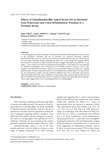Effects of Limosilactobacillus reuteri Strain 164 on Intestinal Gene Expression and Colon Inflammation: Potential as a Probiotic Strain
Japan Agricultural Research Quarterly
| ISSN | 00213551 |
|---|---|
| NII recode ID (NCID) | AA0068709X |

Full text
jarq59-2_155-162.pdf908.72 KB
As weaning piglets are easily susceptible to infections and diarrhea, addressing these issues is critical in pig production. Therefore, the use of probiotics has garnered increasing attention. Limosilactobacillus reuteri (L. reuteri) is one of the most studied probiotics that can colonize the gut of a wide range of animals. Studies examining the effects of L. reuteri in pigs have suggested that it can be used as a probiotic to reduce intestinal diseases in piglets and improve productivity. In our study, L. reuteri strain 164 (L164) was isolated from farm pig feces. The isolated L164 was evaluated for antibiotic susceptibility, and we found that L164 had little antibiotic resistance. L164 is also resistant to low pH and bile treatment, similar to Lacticaseibacillus rhamnosus strain GG, a notable probiotic strain. The gene expression analysis of L164-ingested mice indicated that L164 may activate the aryl hydrocarbon receptor, decrease intestinal epithelial stem cells in the ileum, and increase enterochromaffin cells in the colon. Furthermore, experiments using a mouse model of colitis showed that L164 inhibited colon shortening caused by a chemical colitogen and reduced diarrheal symptoms. These results suggest that L164 is a promising probiotic for weaning piglets.
| Date of issued | |
|---|---|
| Creator | Reiji AOKI Naoko MORIYA Tadashi TAKINO Hiromi KIMOTO-NIRA |
| Subject | antibiotics weaning piglets |
| Publisher | Japan International Research Center for Agricultural Sciences |
| Received Date | 2024-05-21 |
| Accepted Date | 2024-08-30 |
| Available Online | |
| Volume | 59 |
| Issue | 2 |
| spage | 155 |
| epage | 162 |
| DOI | 10.6090/jarq.24J06 |
| Language | eng |
